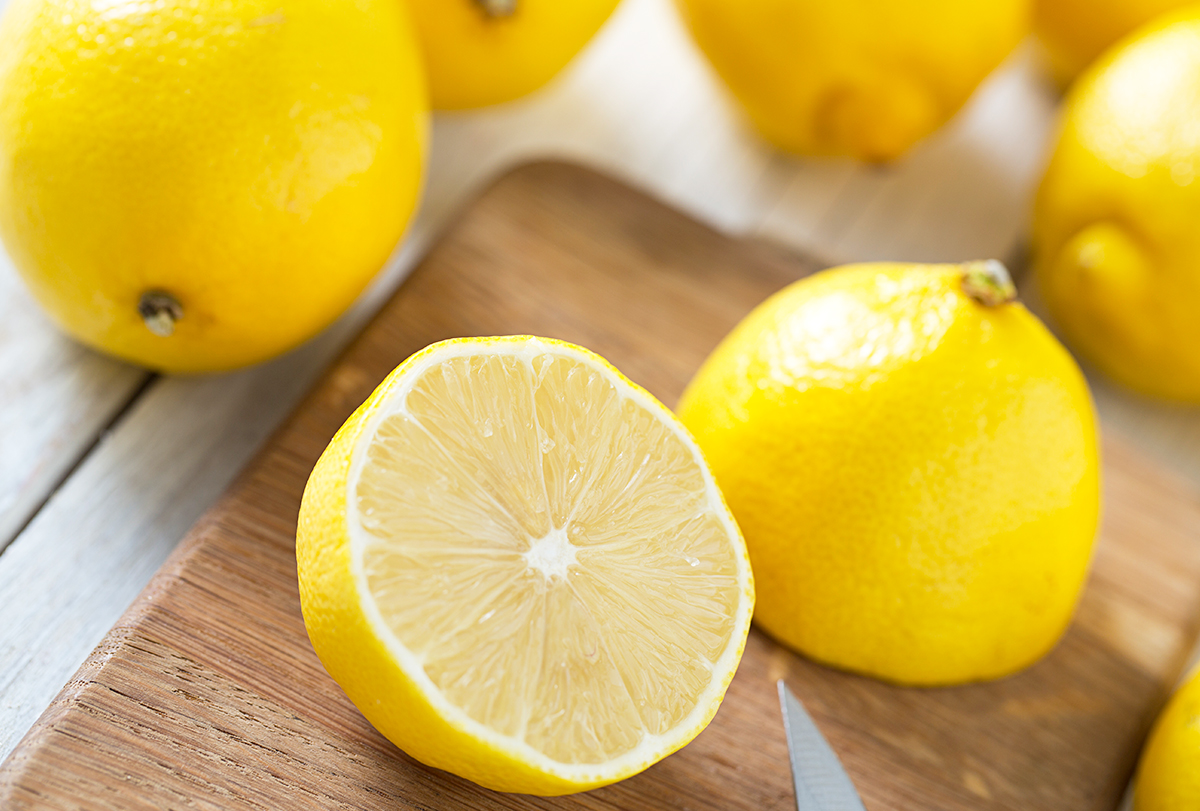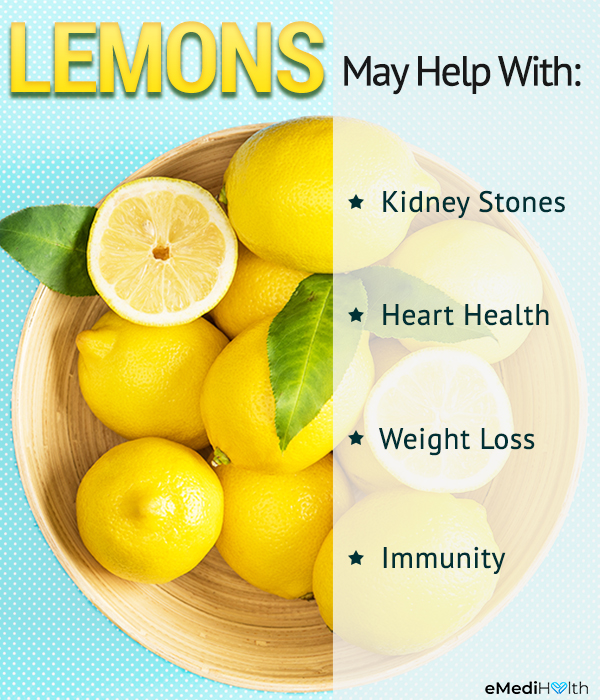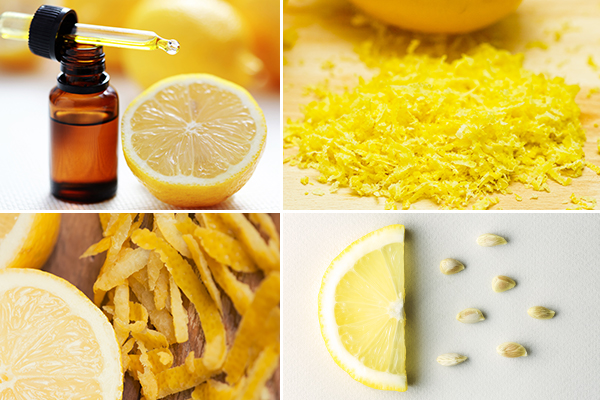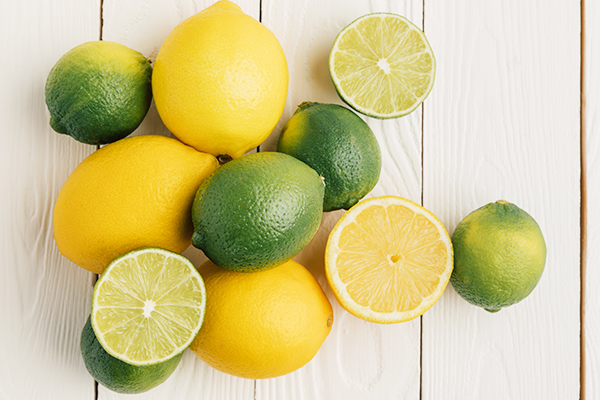In this article:
Lemon (Citrus limon) is a popular fruit around the globe and is used in cooking, baking, making beverages, cleaning, and more.

Every part of the lemon, from peel to flesh, can be used and enjoyed. As many cultures have enjoyed lemon for centuries, it is found in many cuisines. Lemon juice is sold fresh, canned, concentrated, frozen, dehydrated, and powdered. It is also sometimes included in pharmaceutical products.
Nutrition Facts of Lemon
Lemon contains many nutrients and is a good source of calcium, iron, magnesium, potassium, fiber, and vitamins A, B, and C. It is also rich in water.
One hundred grams of lemon contains:
- 29 calories
- 1 gram of protein
- Very little fat
- 9 grams of carbohydrate
- Almost 3 grams of fiber
- 138 mg of potassium
- 53 mg of vitamin C (1)
Lemon Varieties
The popular varieties of lemon are:
- Eureka – Very pale-green flesh, pointed bottom and rippled rough skin
- Meyer – A hybrid that has a smooth pale-orange skin and a sweet taste
- Lisbon – Yellow flesh with smooth skin, often used in cooking and juicing; the most commonly grown
Health Benefits of Lemon

Lemon has long been used for health purposes. The citric acid in lemon is known for its immune-boosting, antibacterial, and antiviral qualities. Research does support some benefits of this bright-yellow fruit. However, more studies are required to establish the efficacy of these effects.
1. May prevent kidney stones
Lemons boast having the highest citrate concentration of all citrus fruits. Citrate binds to calcium, which can help prevent kidney stones from forming. (2) One study found that drinking lemonade increased urinary citrate and overall urine volume, which are beneficial for the prevention of kidney stones. (3)
ALSO READ: 10 Foods That Are Good for the Kidneys
2. Promotes cardiovascular health
One of the risk factors for heart disease is a decrease in vasodilation capability.
Vitamin C relaxes the blood vessels and helps them dilate. Moreover, some studies found that vitamin C may improve cholesterol levels, stiffness in the arteries, and the lining of the arteries. (4)(5)
Additionally, citrus fruits such as lemons contain flavonoids that help improve high cholesterol levels, insulin resistance, fatty liver, plaques in the arteries, and obesity. (6) Potassium can also help lower blood pressure and lemons are good sources of this mineral. (7)
Lemons contain compounds that may promote cardiovascular health. Vitamin C may help relax the blood vessels and reduce high blood pressure and high cholesterol levels.
3. May help with weight loss
Many people believe that drinking hot lemon water can help with weight loss. But there is not much evidence that can prove this method to be effective.
One study found that drinking lemon-honey juice four times a day while fasting helped individuals lose weight, but it remains unclear whether it was the lemon-honey juice or the act of fasting that helped. (8)
4. Boosts immunity
Lemons contain a lot of vitamin C, which has been shown to bolster the immune system and help the body fight off colds, flu, and other illnesses. (9)(10) Lemons also contain saponins, which act as antimicrobial agents and may help fight off bacteria.
5. May improve digestion
Some people believe that lemon can aid digestion by stimulating the liver to produce more bile. However, no evidence has supported this claim. Nevertheless, drinking lemon water after a meal is considered safe. Although it is acidic, it is hydrating, which can help with digestion.
ALSO READ: Foods to Improve Your Digestion
Different Ways to Use a Lemon

You can use the different parts of lemon for various purposes.
1. Lemon essential oil
Lemon oil contains d-limonene, l-limonene, and terpenes, as well as the aldehyde citral, which is responsible for lemon’s distinct aroma. One study found that citrus oil used in aromatherapy may help relieve labor pain. It may also reduce nausea and vomiting and elevate mood. (11)(12)
2. Lemon peel and zest
The peel of a lemon has some calcium, vitamin C, potassium, and fiber. It is also a source of antioxidant flavonoids and pectin. (13) The limonene in lemon peels and oil may have cancer-fighting properties and may also help relieve heartburn.
3. Lemon seeds
The oil from lemon seeds is often used in beauty products, pharmaceuticals, and supplements. It is believed that lemon seed oil helps to detoxify the digestive system and treat acne, although none of these claims have been proven.
Selection and Storage
Lemons should be heavy for their size with a firm, smooth, thin skin. They can be kept in the refrigerator for up to 2 weeks.
Side Effects and Safety of Lemons
While lemons are generally thought to be safe, excessive consumption can be problematic due to its high acidity.
- Tooth enamel can erode if frequently exposed to acidic foods, such as lemons. If you drink lemon water regularly, it may be beneficial to brush your teeth afterward.
- Acidic foods may also irritate existing mouth sores.
- Excessive vitamin C can lead to nausea and stomach pain.
- When taken excessively, lemons and lemon juice may result in excessive urination, which in turn may cause dehydration.
- The amino acid tyramine found in lemons may trigger migraines.
- If you are using lemon juice topically on your skin, do a patch test first. It may be too harsh for certain skin types.
Most-Asked Questions About Lemons
Are lemons and limes the same?

Lemons are oval and have a yellow, textured, sometimes bumpy peel.
Limes are smaller in sizes, can be oval or round, and have a green peel and flesh. They do contain more natural sugar and are therefore considered to be less sour than lemons.
Can lemon cure cancer?
There are some claims that drinking lemon water for 1–3 months will cause cancer to “disappear.” This claim has absolutely no scientific evidence.
The amount of beneficial compounds in lemon does not match the equivalent needed to be a therapeutic alternative to chemotherapy, radiation therapy, or other proven methods. (14)(15)
Are citric acid intolerance and allergies the same?
A citrus allergy is caused by a reaction to a specific protein found in citrus fruits.
People with an intolerance to citric acid may react not only to citrus fruits but also to some vegetables and processed foods that contain citric acid as a preservative. Citric acid intolerance does not trigger an autoimmune response, whereas an allergy does.
Expert Answers (Q&A)
Answered by Ms. Kathleen Putnam, MS, RDN, CDN
Lemons were once known to be the best way to prevent scurvy. Today, with supplementation of the food supply and enrichment of so many products, lemons are no longer typically used this way.
Lemons are still excellent natural sources of vitamin C and bioflavonoids, which are both antioxidants.
Applying lemon juice externally to light-skinned individuals may increase the risk of sunburn. Hence, such use is not advised.
There are no known food/medication interactions with lemons.
Drinking lemon water daily may elevate the citric acid levels in the urine, which may help prevent kidney stones if they contain calcium. However, this claim remains inconclusive.
Hypothetically, if lemon juice is added to your diet to boost the vitamin C content while adding iron-rich foods that are non-heme sources of iron (plant sources of iron such as nuts, seeds, beans, whole grains, and greens), lemons could indirectly improve iron deficiency anemia.
Vitamin C, not lemon per se, has been shown to be beneficial when added to facial products because, as an antioxidant, it helps protect the skin. (16)
However, the application of lemon itself to the skin may cause problems upon sun exposure and, therefore, is not recommended.
Lemons are flavor enhancers. Lemons (both the juice and zest) can bring out the flavor of a number of dishes and beverages.
– Add slices of lemons to your water each day for a refreshing drink.
– Squeeze lemon over your vegetables, grains, and salads (both fruit and green salads) for added flavor.
– Add lemon juice to dishes instead of salt to help reduce sodium in your diet.
Final Word
Lemons are popular around the world and used in a variety of ways. They can be enjoyed safely in moderation in a variety of dishes.
Lemons can help boost immunity and may improve kidney and heart health. However, many other health claims have been overblown and lack scientific evidence.
- Was this article helpful?
- YES, THANKS!NOT REALLY


